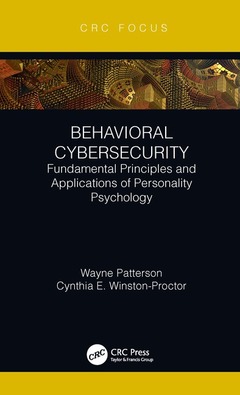Behavioral Cybersecurity Fundamental Principles and Applications of Personality Psychology
Auteurs : Patterson Wayne, Winston-Proctor Cynthia E.

This book discusses the role of human personality in the study of behavioral cybersecurity for non-specialists.
Since the introduction and proliferation of the Internet, cybersecurity maintenance issues have grown exponentially. The importance of behavioral cybersecurity has recently been amplified by current events, such as misinformation and cyber-attacks related to election interference in the United States and internationally. More recently, similar issues have occurred in the context of the COVID-19 pandemic.
The book presents profiling approaches, offers case studies of major cybersecurity events and provides analysis of password attacks and defenses. Discussing psychological methods used to assess behavioral cybersecurity, alongside risk management, the book also describes game theory and its applications, explores the role of cryptology and steganography in attack and defense scenarios and brings the reader up to date with current research into motivation and attacker/defender personality traits.
Written for practitioners in the field, alongside nonspecialists with little prior knowledge of cybersecurity, computer science, or psychology, the book will be of interest to all who need to protect their computing environment from cyber-attacks. The book also provides source materials for courses in this growing area of behavioral cybersecurity.
1. Recent Events. 2. Behavioral Cybersecurity. 3. Personality Psychology Theory and Methods of Assessment. 4. Hacker Case Study Personality Analysis and Ethical Hacking. 5. Profiling. 6. Access Control. 7. The First Step: Authorization. 8. Origins of Cryptography. 9. Game Theory. 10. The Psychology of Gender. 11. Turing Tests. 12. Modular Arithmetic and Other Computational Methods. 13. Modern Cryptography. 14. Steganography and Relation to Crypto. 15. A Metric to Measure Attacks/Defenses. 16 Behavioral Economics. 17. Fake News. 18. Exercises: “Hack Labs”. 19. Conclusions.
Dr. Wayne Patterson is a retired professor of computer science from Howard University. He is also currently co-principal investigator for the NSF-funded GEAR UP project at Howard, which has supported almost 300 STEM undergrads to do summer research in 15 developing countries. He has also been Director of the Cybersecurity Research Center, Associate Vice Provost for Research, and Senior Fellow for Research and International Affairs in the Graduate School at Howard. He has also been Professeur d’Informatique at the Université de Moncton, Chair of the Department of Computer Science at the University of New Orleans, and in 1988 Associate Vice Chancellor for Research there. In 1993, he was appointed Vice President for Research and Professional and Community Services, and Dean of the Graduate School at the College of Charleston, South Carolina. In 1998, he was selected by the Council of Graduate Schools, the national organization of graduate deans and graduate schools, as the Dean in Residence at the national office in Washington, DC. His other service to the graduate community in the United States has included being elected to the presidency of the Conference of Southern Graduate Schools, and to the Board of Directors of the Council of Graduate Schools. Dr. Patterson has published more than 50 scholarly articles primarily related to cybersecurity; one of the earliest cybersecurity textbooks, Mathematical Cryptology; and subsequently three other books. He has been the principal investigator on over 35 external grants valued at over $6,000,000. In August 2006, he was loaned by Howard University to the U.S. National Science Foundation to serve as the Foundation’s Program Manager for International Science and Engineering in Developing Countries, and in 2017 was Visiting Scholar at Google. He received degrees from the University of Toronto (BSc and MSc in Mathematics), University of New Brunswick (MSc in Computer Science), and University of Michigan (PhD in Mathematics).
Date de parution : 12-2020
13.8x21.6 cm
Thèmes de Behavioral Cybersecurity :
Mots-clés :
Cryptographic Method; Fake News; Cryptology; Hold; Profiling; RSA Cryptosystem; Passwords; RSA Public Key Cryptosystem; Game Theory; Turing Test; Hack Labs; F0 F0 F0 F0 F0; Ransomware Attack; Personality psychology; ABCD; Behavioral cybersecurity; Ago; Password attacks; Dumpster Diver; ABCD Method; Steganography; Galois Field; Ciphertext; Plaintext Message; Hack Lab; F4 E2 2b 9a C6; Cybersecurity Events; AES; Follow; Morris Worm; Cryptographic Techniques; Complex Sociocultural Context; D4 Bf



